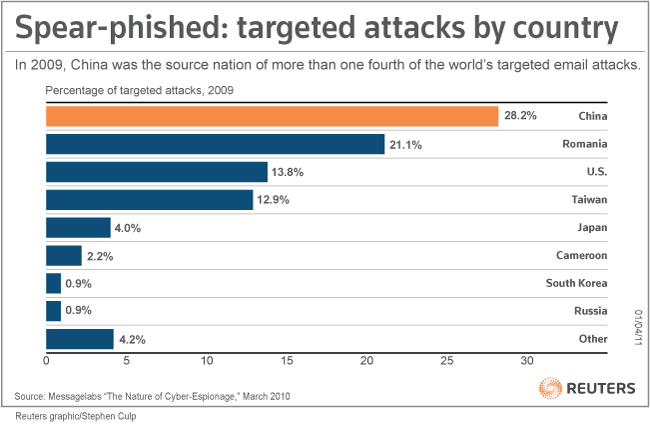US State Department cables obtained by WikiLeaks has revealed that US investigators fear that China has stolen 'terabytes' of sensitive data from the US Government.

In a cable obtained by Reuters, investigators expressed fears about the theft of usernames and passwords for State Department computers to designs for multi-billion dollar weapons systems.
The cable revealed how the US traced systems breaches -- colourfully code-named "Byzantine Hades" by investigators -- to the Chinese military. An April, 2009 cable even pinpoints the attacks to a specific unit of China's People's Liberation Army.
"The attacks coming out of China are not only continuing, they are accelerating," said Alan Paller, director of research at information-security training group SANS Institute in Washington, DC.
Privately, US officials have long suspected that the Chinese Government and in particular the military was behind the cyber-attacks. What was never disclosed publicly, until now, was evidence.
US efforts to halt Byzantine Hades hacks were ongoing, according to four sources familiar with investigations. In the April, 2009 cable, officials in the State Department's Cyber Threat Analysis Division noted that several Chinese-registered Web sites were "involved in Byzantine Hades intrusion activity in 2006."
The sites were registered in the city of Chengdu, the capital of Sichuan Province in central China, according to the cable. A person named Chen Xingpeng set up the sites using the "precise" postal code in Chengdu used by the People's Liberation Army Chengdu Province First Technical Reconnaissance Bureau (TRB), an electronic espionage unit of the Chinese military. "Much of the intrusion activity traced to Chengdu is similar in tactics, techniques and procedures to (Byzantine Hades) activity attributed to other" electronic spying units of the People's Liberation Army, the cable says.
Reconnaissance bureaus are part of the People's Liberation Army's Third Department, which oversees China's electronic eavesdropping, according to an October 2009 report by the U.S.-China Economic and Security Commission, a panel created by Congress to monitor potential national security issues related to US-China relations. Staffed with linguists and technicians, the Third Department monitors communications systems in China and abroad. At least six Technical Reconnaissance Bureaus, including the Chengdu unit, "are likely focused on defense or exploitation of foreign networks," the commission report states.
The precise relationship with the Chinese Army of suspected hacker Chen Xingpeng could not be immediately determined. A spokesman for the Chinese embassy in Washington did not respond to multiple requests for comment. The U.S. State Department declined to comment.
But the leaked cables and other US Government reports underscore how Chinese and other state-sponsored and private hackers have overwhelmed US Government computer networks. In the last five years, cyber-intrusions reported to the US Computer Emergency Response Team, a unit of the Department of Homeland Security, have increased more than 650 percent, from 5503 incidents in fiscal 2006 to 41,776 four years later, according to a March 16 report by the Government Accountability Office.

THE BUSINESS OF SPYING
The official figures don't account for intrusions into commercial computer networks, which are part of an expanding cyber-espionage campaign attributed to China, according to current and former US national security officials and computer-security experts.
In the last two years, dozens of US companies in the technology, oil and gas and financial sectors have disclosed that their computer systems have been infiltrated.
In January last year, internet search giant Google announced it was the target of a sophisticated cyber-attack using malicious code dubbed Aurora, which compromised the Gmail accounts of human rights activists and succeeded in accessing Google source code repositories.
The company, and subsequent public reports, blamed the attack on the Chinese Government.
The Google attack "was certainly an escalation of Chinese network operations against the U.S.," said Joel Brenner, former counterintelligence chief for the Office of the Director of National Intelligence. "Thousands" of US companies were targeted in the Aurora attacks, Brenner says -- far more than the estimated 34 companies publicly identified as targets so far -- a scale which Brenner says demonstrates China's "heavy-handed use of state espionage against economic targets."
Many firms whose business revolves around intellectual property -- tech firms, defense group companies, even Formula One teams -- complain that their systems are now under constant attack to extract proprietary information. Several have told Reuters they believe the attacks come from China.
Some security officials say firms doing business directly with Chinese state-linked companies -- or which enter fields in which they compete directly -- find themselves suffering a wall of hacking attempts almost immediately.
The full scope of commercial computer intrusions is unknown. A study released by computer-security firm McAfee and government consulting company SAIC on March 28 shows that more than half of some 1000 companies in the US, Britain and other countries decided not to investigate a computer-security breach because of the cost. One in 10 companies will only report a security breach when legally obliged to do so, according to the study.
"Simply put, corporations cannot afford negative publicity (about computer security breaches)," says Tom Kellermann, vice president of security awareness at Core Security Technologies and a contributor to the study.
Read on for a detailed breakdown of the phishing attacks used...


_(33).jpg&h=140&w=231&c=1&s=0)


.png&h=140&w=231&c=1&s=0)





 iTnews Executive Retreat - Security Leaders Edition
iTnews Executive Retreat - Security Leaders Edition
 iTnews Cloud Covered Breakfast Summit
iTnews Cloud Covered Breakfast Summit
 The 2026 iAwards
The 2026 iAwards












_(1).jpg&h=140&w=231&c=1&s=0)



